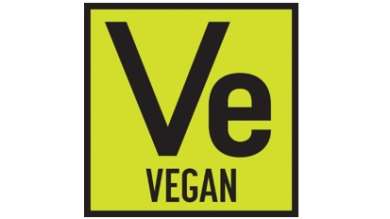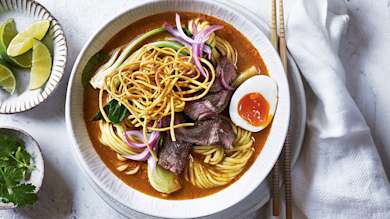
Meat-free made easy
Fancy a snack or simple midweek meal?
We’ve made going vegan even easier with our plant-based ready meals that offer something for every occasion and taste such as the Incredible Burger or Creamy Coconut Cauliflower Curry.

The Eatwell Guide encourages us to eat a more plant based diet and to eat less red meat (beef, lamb, pork) and processed meats such as bacon, ham and continental meats.
A plant based diet focuses around including more fruit, veg, pulses, nuts and wholegrains, however it still can include some meat and dairy. Eating a more plant based diet can help you achieve your 5 a day more easily and get more fibre.
You can make small changes to eat more plants such as bulking out meals with vegetables or pulses such as chickpeas or beans. Check out our 5 a day page for tips on how to increase fruit & veg into your diet throughout the day.
If you’re vegetarian or vegan, it’s important to ensure you’re still getting enough of certain nutrients which are usually found in meat, dairy and egg products in the UK. A well-planned vegetarian or vegan diet can provide the nutrients you need. Below is a list of these key nutrients and their alternative food sources, try to include these in your diet.

Protein
This is needed for growth and maintenance of muscle mass. Protein is made up of long chains of a substance called amino acids. Our bodies can make some of these amino acids but we get some other essential amino acids from protein sources in our diet.
Everyone requires a different amount of protein per day depending on their weight. To work out how much protein you need, multiply your weight in kg by 0.75. So, for example, if you weigh 70kg then you will need to eat approx 53g of protein per day. You’ll be able to find the protein content in products in the nutrition table on the back of labels.
Here are some examples of protein sources but it’s not an exhaustive list:
Some meal examples are:

Selenium
This contributes to the normal function of the immune system and the maintenance of normal hair and nails.
Males over 19 years old require 75µg (micrograms) and females over 19 years old require 60µg (micrograms) of selenium every day.
Sources include:
Some examples:

Iron
This contributes to the normal formation of red blood cells and normal oxygen transport around the body. Teenage girls and women of child bearing age need to consume more iron than men of a similar age. A lack of iron in your diet can lead to iron deficiency anaemia with symptoms such as feeling tired and looking pale. If you feel you may be deficient then visit your GP for medical advice.
Depending on your age and sex, you will need the following amount of iron (µg (micrograms)) per day:
| Age Group | Males (µg (micrograms)) | Females (µg (micrograms)) |
|---|---|---|
| 11-18yrs | 11.3 | 14.8 |
| 19-64 | 8.7 | 14.8 (19-50yr old) 8.7 (50-64yr old) |
Here are some examples of plant sources but it’s not an exhaustive list:
Try to eat foods high in Vitamin C with these to help with the absorption of iron. For example, drink a glass of orange juice with your meals or add vegetables such as peppers or broccoli to your bean chilli or chickpea curry.
Some meal/snack examples are:

Calcium
This is needed for the maintenance of normal bones and teeth. Our bones keep growing until we reach what’s called our peak bone mass during our late teenage years/early twenties.
We lose bone mass as we get older so it’s important you include plenty of calcium in your diet to prevent conditions such as osteoporosis (thinning of the bones).
Women are at greater risk of osteoporosis and reduced bone density after the menopause so it’s particularly important that this age group are consuming plenty of calcium.
The recommended daily intakes (µg (micrograms)) of calcium in the UK are:
| Age group | Males (µg (micrograms)) | Females (µg (micrograms)) |
|---|---|---|
| 11-18yrs | 1000 | 800 |
| 19yrs + | 700 | 700 |
In the UK, milk and milk products are the major source of calcium.
However, here are some non-dairy examples:
Some examples:
It’s important you’re getting enough Vitamin D as this contributes to normal blood calcium levels. See below for more information.

Vitamin D
This contributes to the maintenance of normal bones and teeth.
It’s recommended that we get 10µg (micrograms) of Vitamin D each day. The main source of Vitamin D comes from sunlight, but we rarely get enough during the winter months so the government has advised that everyone over the age of 5 should consider taking a daily supplement containing 10µg (micrograms) of Vitamin D from October to March. Please seek medical advice from your doctor before taking supplements and ask for a vegan version as some Vitamin D supplements are not vegan friendly.
You’ll need to check the label on products such as the below to see if they have been fortified with Vitamin D and to see the Vitamin D content in the products. Examples include:

Omega 3
We all need some fat to stay healthy. Fat is made up of components called fatty acids. Omega 3 fatty acids (alpha linoleic acid) are known as essential fatty acids as it can’t be made in the body so we need to get it from our diets.
ALA can convert into other Omega 3 fats including docosahexaenoic acid (DHA) and eicosapentaenoic acid (EPA) in the body. EPA and DHA contribute to the normal function of the heart. These can also be obtained from your diet. You may have heard that the main source of Omega 3 in our diets comes from oily fish but there are also plant sources.
Here are some examples of plant sources of Omega 3. Look out for ‘source of Omega 3’ or ‘High in Omega 3’ messages on labels.

Vitamin B12
This contributes to the normal function of the immune system and to the reduction of tiredness and fatigue. Vitamin B12 is only found naturally in animal sources so you’ll need to look out for fortified foods and perhaps seek medical advice from your doctor to see if you need supplements. Symptoms of being deficient in this vitamin include extreme tiredness and muscle weakness. You should aim for 1.5µg per day. Look out for fortified sources such as the below. You’ll be able to find the amount of Vitamin B12 on the nutrition table on the back of the pack of fortified foods. Sources include:

Vitamin deficiency
If you feel you may be deficient in any of these vitamins or minerals then please seek advice from your GP.

Look out for these vegan and vegetarian logos on our products to help you easily identify products in our stores. We also have a list of all our vegan and vegetarian products and wines to help you plan your shopping list.

For some meal inspiration, check out our Co-op food magazine or go to our vegan and vegetarian recipes page on our Co-op recipes web page.